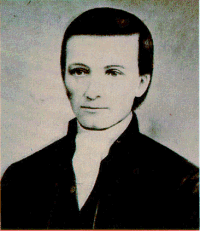Difference between revisions of "Albright, Jacob (1759-1808)"
| [unchecked revision] | [checked revision] |
GameoAdmin (talk | contribs) (CSV import - 20130816) |
SamSteiner (talk | contribs) |
||
| (2 intermediate revisions by one other user not shown) | |||
| Line 1: | Line 1: | ||
| − | + | [[File:AlbrightJacob.jpg|300px|thumb|right|''Jacob Albrecht from an engraving'']] | |
| − | + | On 19 September1732 Johannes and Anna Albrecht arrived in the port of [[Philadelphia (Pennsylvania, USA)|Philadelphia]] from [[Rotterdam (Zuid-Holland, Netherlands)|Rotterdam]] on the <em>Johnson. </em>They were very likely emigrants from the Rhineland and of the Lutheran faith with [[Pietism|pietistic]] inclination. Into their home near Pottstown, [[Pennsylvania (USA)|Pennsylvania]], a second son, Jacob, was born on 1 May 1759. After brief service in the Revolutionary War he was married to Catherine Cope in 1785, bought a farm, and established a tiling business in [[Lancaster County (Pennsylvania, USA)|Lancaster County]], Pennsylvania, near the flourishing [[Ephrata Cloister (Ephrata, Pennsylvania, USA)|Ephrata Cloister]]. | |
| − | '']] On 19 September1732 Johannes and Anna Albrecht arrived in the port of Philadelphia from Rotterdam on the <em>Johnson. </em>They were very likely emigrants from the Rhineland and of the Lutheran faith with pietistic inclination. Into their home near Pottstown, [[Pennsylvania (USA)|Pennsylvania]], a second son, Jacob, was born on 1 May 1759. After brief service in the Revolutionary War he was married to Catherine Cope in 1785, bought a farm, and established a tiling business in [[Lancaster County (Pennsylvania, USA)|Lancaster County]], Pennsylvania, near the flourishing Ephrata Cloister | ||
| − | |||
| − | |||
| − | |||
| + | Dissatisfied with the Lutheran Church in his community, Albright temporarily associated with the Methodists but soon began to preach among his German neighbors and to Germans throughout eastern and central [[Pennsylvania (USA)|Pennsylvania]], [[Maryland (USA)|Maryland]] and [[Virginia (USA)|Virginia]], for whom he believed no adequate religious culture was being provided. By 1800 his followers were so numerous that he established the first classes of the [[United Brethren in Christ Church|United Brethren]] denomination and in 1803 held an official conference of his coworkers. He was named a bishop of the church in 1807 and charged with the responsibility of drafting a form of government and order, which he left incomplete at his premature death on 18 May 1808. He lies buried in Kleinfeltersville, [[Pennsylvania (USA)|Pennsylvania]], where the [[Evangelical Association|Evangelical Church]] (later the [[Evangelical United Brethren Church]]), of which he was the founder, erected a memorial church in 1850. | ||
= Bibliography = | = Bibliography = | ||
| − | Albright, Raymond W. | + | Albright, Raymond W. ''A History of the Evangelical Church.'' Rev. ed. Harrisburg, Pa., 1945: 21-82. |
| − | |||
| − | |||
{{GAMEO_footer|hp=Vol. 1, p. 36|date=1955|a1_last=Albright|a1_first=Raymond W|a2_last= |a2_first= }} | {{GAMEO_footer|hp=Vol. 1, p. 36|date=1955|a1_last=Albright|a1_first=Raymond W|a2_last= |a2_first= }} | ||
| + | [[Category:Persons]] | ||
| + | [[Category:Evangelical Association Leaders]] | ||
Latest revision as of 19:13, 17 July 2015
On 19 September1732 Johannes and Anna Albrecht arrived in the port of Philadelphia from Rotterdam on the Johnson. They were very likely emigrants from the Rhineland and of the Lutheran faith with pietistic inclination. Into their home near Pottstown, Pennsylvania, a second son, Jacob, was born on 1 May 1759. After brief service in the Revolutionary War he was married to Catherine Cope in 1785, bought a farm, and established a tiling business in Lancaster County, Pennsylvania, near the flourishing Ephrata Cloister.
Dissatisfied with the Lutheran Church in his community, Albright temporarily associated with the Methodists but soon began to preach among his German neighbors and to Germans throughout eastern and central Pennsylvania, Maryland and Virginia, for whom he believed no adequate religious culture was being provided. By 1800 his followers were so numerous that he established the first classes of the United Brethren denomination and in 1803 held an official conference of his coworkers. He was named a bishop of the church in 1807 and charged with the responsibility of drafting a form of government and order, which he left incomplete at his premature death on 18 May 1808. He lies buried in Kleinfeltersville, Pennsylvania, where the Evangelical Church (later the Evangelical United Brethren Church), of which he was the founder, erected a memorial church in 1850.
Bibliography
Albright, Raymond W. A History of the Evangelical Church. Rev. ed. Harrisburg, Pa., 1945: 21-82.
| Author(s) | Raymond W Albright |
|---|---|
| Date Published | 1955 |
Cite This Article
MLA style
Albright, Raymond W. "Albright, Jacob (1759-1808)." Global Anabaptist Mennonite Encyclopedia Online. 1955. Web. 2 Feb 2026. https://gameo.org/index.php?title=Albright,_Jacob_(1759-1808)&oldid=132327.
APA style
Albright, Raymond W. (1955). Albright, Jacob (1759-1808). Global Anabaptist Mennonite Encyclopedia Online. Retrieved 2 February 2026, from https://gameo.org/index.php?title=Albright,_Jacob_(1759-1808)&oldid=132327.
Adapted by permission of Herald Press, Harrisonburg, Virginia, from Mennonite Encyclopedia, Vol. 1, p. 36. All rights reserved.
©1996-2026 by the Global Anabaptist Mennonite Encyclopedia Online. All rights reserved.

